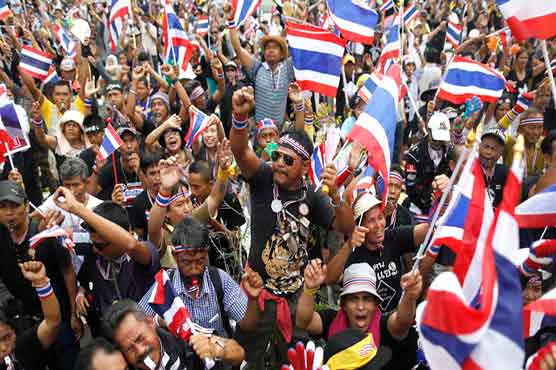Thai police fire tear gas at protesters in Bangkok

Thai protesters were massing outside Government House to overthrow PM Yingluck in Bangkok.
BANGKOK (AFP) - Thai police fired tear gas and water cannon Sunday at protesters trying to force their way into Government House to overthrow Prime Minister Yingluck Shinawatra, after violence in the capital left two dead and dozens wounded.
The bloodshed is the latest in a series of outbreaks of civil strife in the kingdom since royalist generals ousted billionaire tycoon-turned-premier Thaksin Shinawatra, Yingluck s brother, seven years ago.
The mass street rallies, aimed at replacing Yingluck s government with an unelected "people s council", are the biggest since political violence in Bangkok three years ago left dozens dead in a military crackdown.
Protesters were massing outside Government House on Sunday following a threat by their leader to seize the offices of Yingluck, who was overseeing the situation from an emergency base elsewhere in the city.
Police fired several tear gas cannisters as well as water cannon after protesters tried to breach barricades and cut barbed wire protecting the seat of government, which was heavily guarded by security forces including unarmed soldiers, according to an AFP reporter.
Tear gas was also fired near the city s metropolitan police headquarters several kilometres (miles) away where demonstrators were also gathering, television footage showed.
Tensions were high after violence broke out late Saturday in the area around a suburban stadium where tens of thousands of pro-government "Red Shirts" had gathered in support of Yingluck, who has faced weeks of street protests.
The dead and injured suffered a range of wounds including gunshots and stabbings. The circumstances were unclear but the violence came after an anti-government mob attacked Red Shirts arriving to join the rally in Ramkhamhaeng district.
"The confirmed toll is now two dead and 45 injured," an official at the city s Erawan emergency centre told AFP, amid reports of sporadic outbreaks of violence near the stadium on Sunday morning.
They were the first deaths since the mostly peaceful demonstrations began a month ago. Both sides blamed each other for attacking their supporters.
The violence prompted Red Shirt leaders to end their rally, which had drawn tens of thousands of mainly rural poor in support of Yingluck and her brother Thaksin, who lives in self-imposed exile but remains a hugely divisive figure in Thailand.
"In order to avoid further complicating the situation for the government, we have decided to let people return home," Red Shirt leader Thida Thavornseth told the crowd.
While the protesters numbers have fallen sharply since an estimated crowd of up to 180,000 people joined an opposition rally on November 24, they have increasingly sought out high profile targets in what experts believe could be an attempt to provoke a military coup.
The firebrand leader of the anti-government demonstrators on Sunday vowed to push ahead with planned marches on several key sites including the heavily guarded Government House, major television channels and the police headquarters.
"Our operation today must be peaceful and non-violent... enter places with politeness," said Suthep Thaugsuban, a former deputy prime minister who helped oversee a military crackdown on pro-Thaksin supporters three years ago that left more than 90 people dead.
"You must obey your leaders when they say to move forward or to withdraw," he said, adding "if anything happens we must stand still and not fight or use weapons".
Authorities are deploying more than 2,700 troops to reinforce security in Bangkok, the first time a significant number of soldiers have been deployed to cope with the unrest.
Protests were triggered by an amnesty bill, since abandoned by the ruling party, that opponents feared would have allowed the return of fugitive former premier Thaksin, whose overthrow by royalist generals in 2006 unleashed years of political turmoil.
Thaksin is adored by many of the country s rural and urban working class for his populist policies while in power, but hated by many southerners, middle-class Thais and the Bangkok elite, who see him as corrupt and a threat to the monarchy.
Organisers of the anti-government demo have urged people to turn out in strength on Sunday for a final bid to topple Yingluck s government before celebrations for revered King Bhumibol Adulyadej s birthday on December 5, which is traditionally marked in an atmosphere of calm and respect.
The protesters arch enemy Thaksin lives in self-imposed exile to avoid a jail term for a corruption conviction that he contends is politically motivated, but is widely believed to be the real power behind the ruling party.
Pro-Thaksin parties have won every election for more than a decade but Yingluck has given no indication that she is thinking of calling fresh polls as a way out of the crisis.



